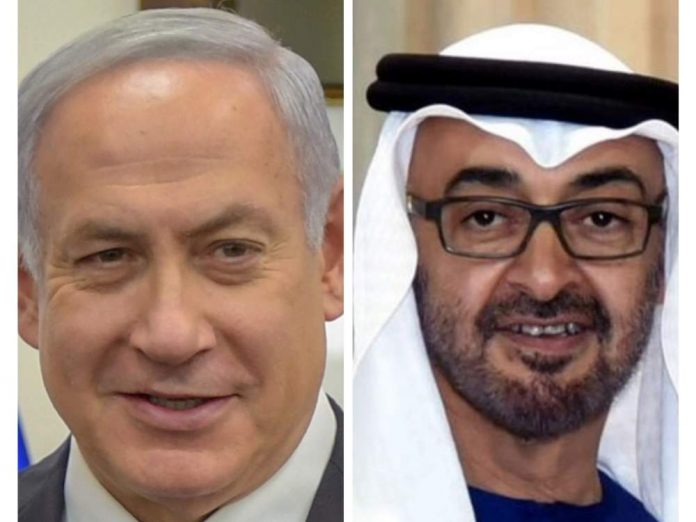The agreement “Abraham Accord” is an attempt to establish peace in the Middle East by convincing Israel to “halt” its annexation in the West bank in return for diplomatic ties with UAE. This is seen as a positive step in establishment of harmony in the region, however, others see this step as a bid by the Trump administration to flaunt the success factor in its foreign policy prior to US elections. From India’s perspective, it is a win-win situation. However, it will be interesting to see how this initiative contributes to West-Asian regionalism.
Aug. 13 marked the beginning of diplomatic relations between Israel and the United Arab Emirates, the two most dynamic societies and advanced economies of the Middle East. As per the agreement, Abu Dhabi and Tel Aviv have agreed to cooperate and set a roadmap towards establishing a bilateral relationship. Israel has committed to suspend its annexation plans for the Palestinian territories. However, the Israeli Prime Minister Benjamin Netanyahu made himself clear that he has agreed to “delay” the annexation, but the plans still remain “on the table.” He had announced earlier this year to annex large parts of the West Bank, which is home to nearly 3 million Palestinians and 450,000 Jewish settlers. But he backed off the idea later due to the spike in COVID-19 cases and the disagreement over how to handle annexation in Israel.
The deal is indeed a very significant initiative in improving Israel’s relations with Arab states. UAE is on the way to become an influential power in the Gulf, whereas Israel will get a diplomatic and economic opening, that could open other doors of opportunities and make its security interests legitimate. UAE has become the first Gulf country to reach a deal on normalizing relations with Israel and the third Arab country to sign a peace agreement with Israel after Egypt (1979) and Jordan (1994). Israel has not been recognized or has formal relations with other Arab states. For many years, Israel has been cautiously fostering relations with the UAE and other Gulf countries as they have hostile relations with Iran.
The agreement seemed to come out of the blue, but the relationship between both the West-Asian countries had been blossoming behind the scenes for many years. Although UAE’s first President referred to Israel as ‘enemy’ in 1971, the UAE and Israel have held informal ties for years. In 2015, Israel announced its plan to open a diplomatic office in the UAE in 2015 and military declaration amidst the rising tensions with Iran. Since then, both the countries had been working together in the field of intelligence, technology, military, business, and politics and had under-the-table contacts, which can now be conducted openly. Israel and UAE have also been working together to fight the COVID-19 pandemic even prior to signing the agreement. This was confirmed by Israeli Prime Minister Benjamin Netanyahu who said that the countries were in close cooperation against the pandemic. Both the countries will further expand and boost cooperation for treatment and the development of a vaccine for the coronavirus. They will work together in an attempt to save the lives of people throughout the region irrespective of religion or nationality.
Israel and the UAE are two of the US’s most reliable and capable regional partners. The US has played a vital role in concluding this agreement. This step is said to be a part of President Trump’s Vision for Peace, for which he has also been appreciated by Israel’s PM and UAE’s Crown Prince with regard to the pragmatic and unique approach he has taken to achieve it. This peace agreement, intended to begin a new era of harmony in the Gulf region and form an anti-Iran alliance, is also seen as a bid by the Trump administration to flaunt the success factor in its foreign policy. Even Joe Biden, his counterpart, who hopes to win the presidential race against a post-Covid weakened Trump, had no choice but to praise the deal as “a historic step.” The deal is seen as an attempt to give an advantage to Trump over Biden before the US presidential elections because according to the polls, Joe Biden is likely to win the White House in November. If that happens, the Biden administration is expected to have an Iran policy closer to Obama’s than to Trump’s, which is not desirable for both the countries.
The actors in the Gulf region appear to be divided into factions according to their reactions on the news. Countries like Turkey, Iran, Syria, and the Palestinian Authority have reacted negatively to the news. Iran has condemned the move to normalize relations as the “fake, illegitimate and anti-humane Zionist regime” calling it a “dangerous measure” and added that this step will help Israel in gaining a “foothold in the region.” Turkey has also threatened to “take a step in the direction of suspending diplomatic ties with the Abu Dhabi leadership or pulling back ambassadors.” Palestinian leaders who sought a two-state solution, have rejected and denounced the trilateral announcement. Hamas has called the accord a “stabbing in the back of people” by the UAE.
Other Arab powers including Egypt, Jordan, Bahrain, and Oman have welcomed the statement. Jordan’s leadership expects that the UAE-Israel deal could push forward stalled peace negotiations if it succeeds in prodding Israel to accept a Palestinian state on land that Israel had occupied in the 1967 Arab-Israeli War. If Israel dealt with it as an incentive to end the occupation, it will move the region towards a just peace. Seven days after the signing of accord, Saudi Arabia came up with a very cautious approach to the situation. It welcomed normalization and said that the agreement “could be viewed as positive,” because it halted Israel’s unilateral decision to annex the West Bank territory. However, it also reiterated criticism of Israel’s “unilateral policies” of annexation and building settlements in the occupied West Bank as “illegitimate” and “detrimental” to a two-state solution and added that it will be open to full ties with Israel only if Israel concludes a peace agreement with Palestine in accordance with Arab Peace Initiative which was sponsored by Saudi Arabia itself in 2002.
India considers the region as an ‘extended neighborhood’ and shares strong diplomatic relations with both Israel and UAE. Israel is India’s close defense partner and the third-largest source of key defense equipment for India. India also enjoys strong bonds of friendship with UAE based on cultural, religious, and economic intercourse. India also shares ties with Saudi Arabia, Palestine, Jordan, and other Gulf countries. It is one of the rare extra-regional actors to have cultivated substantial ties with most relevant actors in the region. To gain an important role in its extended neighborhood, India should take advantage of these dynamics and also leverage its economy for a bigger opening in the region. It should also work in order to improve defense and security relations with the regional powers. India can also work on including Iran in a regional security framework in the future, because bringing Iran on board and attempting to maintain harmony between Sunni-majority Arab and Shia-majority Iran is crucial in order to maintain peace in the region.
It seems obvious that this agreement will affect the relationship between Gulf countries and create new dynamics in the global order. It will also reshape the political order of the Middle East and of all those countries which are politically or economically associated with it. For many years, the West-Asian region has been witnessing waves of instability and volatility and the direction of developments in West Asia and its regional and global implications have been a matter of concern for the world. Given the many factors at play, it is difficult to predict whether the conclusion of the Abraham Accord will lead to advancement in Israel’s engagement with other Arab countries, particularly in the long term. But cooperation among the regional actors is expected to create a new geostrategic reality and a more positive, regional environment.
The views and opinions expressed in this article are those of the author.

The author is pursuing M.A. in International Relations at Amity University. She holds an Honors degree in German language and has a keen interest in Asian and European Studies. She was recently awarded a BRICS scholarship to study for a semester in Russia and has a command over 7 languages.


